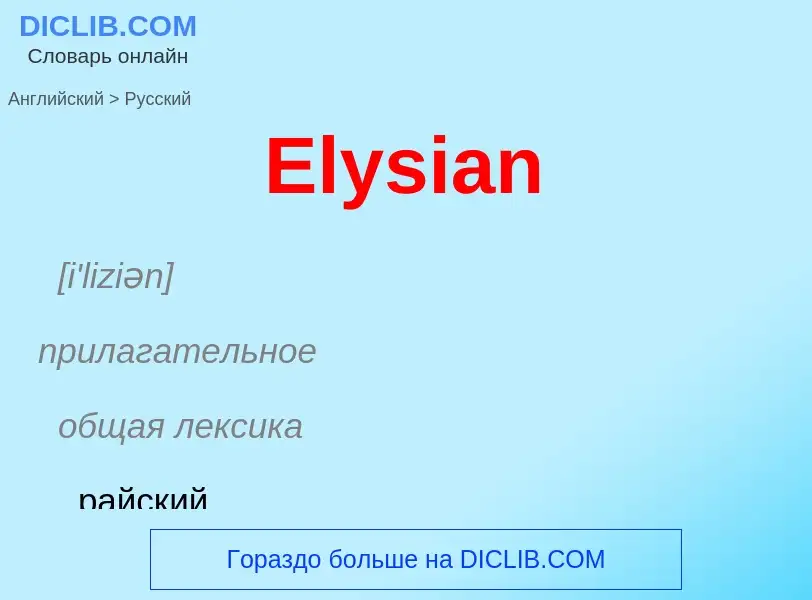Traducción y análisis de palabras por inteligencia artificial ChatGPT
En esta página puede obtener un análisis detallado de una palabra o frase, producido utilizando la mejor tecnología de inteligencia artificial hasta la fecha:
- cómo se usa la palabra
- frecuencia de uso
- se utiliza con más frecuencia en el habla oral o escrita
- opciones de traducción
- ejemplos de uso (varias frases con traducción)
- etimología
Elysian - traducción al ruso
[i'liziən]
прилагательное
общая лексика
райский
блаженный
мифология
относящийся к элизиуму
елисейский
[i'liziəm]
существительное
общая лексика
рай
мир блаженства
мифология
элизий
элизиум
поля блаженных
элизиум, элизий
Definición
Wikipedia

Elysium (, ), otherwise known as the Elysian Fields (Ancient Greek: Ἠλύσιον πεδίον, Ēlýsion pedíon) or Elysian Plains, is a conception of the afterlife that developed over time and was maintained by some Greek religious and philosophical sects and cults. It was initially separated from the Greek underworld – the realm of Hades. Only mortals related to the gods and other heroes could be admitted past the river Styx. Later, the conception of who could enter was expanded to include those chosen by the gods, the righteous, and the heroic. They would remain at the Elysian Fields after death, to live a blessed and happy afterlife, and indulge in whatever enjoyment they had enjoyed in life.
The Elysian Fields were, according to Homer, located on the western edge of the Earth by the stream of Okeanos. In the time of the Greek poet Hesiod, Elysium would also be known as the "Fortunate Isles", or the "Isles (or Islands) of the Blessed", located in the western ocean at the end of the earth. The Isles of the Blessed would be reduced to a single island by the Theban poet Pindar, describing it as having shady parks, with residents indulging in athletic and musical pastimes.
The ruler of Elysium varies from author to author: Pindar and Hesiod name Cronus as the ruler, while the poet Homer in the Odyssey describes fair-haired Rhadamanthus dwelling there. "The Isle of the Blessed" is also featured in the 2nd-century comedic novel A True Story by Lucian of Samosata.


![Rousseau]], installed at Elysium, 1792, ([[Musée de la Révolution française]]) Rousseau]], installed at Elysium, 1792, ([[Musée de la Révolution française]])](https://commons.wikimedia.org/wiki/Special:FilePath/Cabinet de cire, Musée de la Révolution française.jpg?width=200)
![''Elysian Fields'' by [[Carlos Schwabe]], 1903 ''Elysian Fields'' by [[Carlos Schwabe]], 1903](https://commons.wikimedia.org/wiki/Special:FilePath/Schwabe Carlos Elysian Fields.jpg?width=200)
